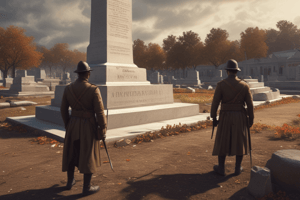Podcast
Questions and Answers
What event triggered the start of WWI?
What event triggered the start of WWI?
- The US joining the Allied Powers
- The sinking of the Lusitania
- The assassination of Archduke Franz Ferdinand (correct)
- The signing of the Zimmerman Telegram
Which countries were part of the Central Powers in WWI?
Which countries were part of the Central Powers in WWI?
- United States, Great Britain, France
- Mexico, Japan, Canada
- Germany, Ottoman Empire, Bulgaria, Austrian-Hungarian Empire (correct)
- Germany, Russia, Italy
What made the sinking of the Lusitania significant?
What made the sinking of the Lusitania significant?
- 128 Americans died, leading to increased support for entering the war (correct)
- It led to the US joining the Central Powers
- It was a result of the Treaty of Versailles
- It marked the beginning of the Great Depression
Who initiated the New Deal during the Great Depression?
Who initiated the New Deal during the Great Depression?
Why was Texas better off during the Great Depression compared to many other states?
Why was Texas better off during the Great Depression compared to many other states?
Which two programs under the New Deal were successful in Texas?
Which two programs under the New Deal were successful in Texas?
What was the main purpose of the Works Progress Administration (WPA) and the Public Works Administration (PWA)?
What was the main purpose of the Works Progress Administration (WPA) and the Public Works Administration (PWA)?
What were some consequences of the Dust Bowl mentioned in the text?
What were some consequences of the Dust Bowl mentioned in the text?
Who were the Axis Powers in WWII?
Who were the Axis Powers in WWII?
What was the economic impact of WWII mentioned in the text?
What was the economic impact of WWII mentioned in the text?
How did propaganda contribute to WWII?
How did propaganda contribute to WWII?
Define 'Armistice' based on the information provided.
Define 'Armistice' based on the information provided.
Flashcards are hidden until you start studying
Study Notes
World War I
- Assassination of Archduke Franz Ferdinand and his wife Sofie sparked the war
- Central Powers: Germany, Ottoman Empire, Bulgaria, Austrian-Hungarian Empire
- Allied Powers: US, Great Britain, France, Russia, Italy
- Sinking of the Lusitania significant due to 128 American deaths, increasing support for war
- Zimmerman Telegram: If Mexico joined the war, Texas would return to Mexico
Great Depression and New Deal
- "Roaring 20's": period of rapid economic growth and social change, featuring flappers, Prohibition, and the Harlem Renaissance
- Stock market crash: October 29, 1929
- Texas better off in the Depression due to less industry and more farming, plus the oil boom
- New Deal: series of programs and projects by President Franklin D. Roosevelt to restore prosperity to Americans
- Successful New Deal programs in Texas: Works Progress Administration (WPA) and Public Works Administration (PWA)
Dust Bowl
- Causes: drought, over plowing, destruction of grasslands, and overuse by livestock
- Ramifications: drop in agricultural prices, foreclosures, emigration, wind erosion, death of livestock and crops, and impossible repairs to tractors, cars, and houses
- 19 states affected, with an average of 43 storms per year in the 1930s
World War II
- D-Day: invasion of Normandy, France, marking a turning point in the war
- November 11th celebrated as Veteran's Day
- Dwight D. Eisenhower: Supreme Commander of the Allied Expeditionary Force in Europe, planned and supervised the invasion of North Africa and Normandy
- Axis Powers: Germany, Italy, Japan, Hungary, Romania, Bulgaria, and Thailand
- Allied Powers: USA, Great Britain, Soviet Union, France, China, Poland, and Canada
- Overall economic effect: 17 million new civilian jobs, 96% increase in industrial productivity, and doubled corporate profits
- Propaganda played a role in mobilizing hatred, convincing the population of the justness of the cause, enlisting support from neutral countries, and strengthening allies
Vocabulary
- War Bond: debt security issued by a government to finance military operations during war or conflict
- Stock: capital raised by a business or corporation through the issue and subscription of ownership
- Great Depression: severe worldwide economic depression that took place mostly during the 1930s
- Speculate: invest in stocks, property, or other ventures with the risk of loss
- Armistice: temporary stopping of open acts of warfare by agreement between opponents
- Internment: state of being confined as a prisoner, especially for political or military reasons
Studying That Suits You
Use AI to generate personalized quizzes and flashcards to suit your learning preferences.




